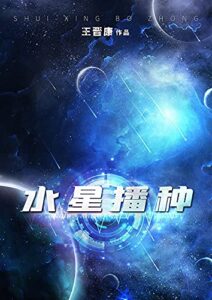translated into English by Alex Woodend.
 This is a weird little novella that definitely feels very old-fashioned old school, almost as if it was lifted entirely from the cutting edge of the mid-20th century. It’s also on the shorter side — never a bad thing — but it definitely felt a little more sketched in than I expected from a nominee for the Hugo Award for Best Novella in 2024. Honestly, I’m a little puzzled as to how this got to the short list: surely there were other, more worthy works that came out this past year? Especially given that this story was originally published in either 2015 or 2002, depending on who you ask.
This is a weird little novella that definitely feels very old-fashioned old school, almost as if it was lifted entirely from the cutting edge of the mid-20th century. It’s also on the shorter side — never a bad thing — but it definitely felt a little more sketched in than I expected from a nominee for the Hugo Award for Best Novella in 2024. Honestly, I’m a little puzzled as to how this got to the short list: surely there were other, more worthy works that came out this past year? Especially given that this story was originally published in either 2015 or 2002, depending on who you ask.
The story itself revolves around Chen Yizhe, a rich Chinese businessman who inherits a mind-boggling legacy from his scientist aunt Sha Wu. She’s managed to create an entirely new, metal-based lifeform, which currently wriggles around as “amoebas” in a special high-temperature smelter she’s constructed. Sha is confident that, given a hundred million years, this lifeform will evolve into something approaching the same kind of sentience and intelligence humanity displays. The first catch isn’t only that it’ll take a hundred million years, but that the most habitable place for her creatures is on the surface of the planet Mercury. The second, and perhaps most important, is that they only have the funding to keep the smelter going for another thirty years. Chen will have to figure out a way to get his charges to Mercury before then, raising funds and overcoming any public outcry in the process.
That’s one major plot thread. The other revolves around a struggle between science and theology, as explorers plunge further into the forbidden North Pole, using technology proscribed by the church to uncover the truth of their origins. It’s not really a surprise that these explorers are descendants of the amoebas that Chen managed to seed Mercury with. What’s really interesting is both how that came to be, as well as how these descendants continue to evolve intellectually in ways reminiscent of humanity despite being quite physically different.
I think that if the themes of this sci-fi novella had been explored in more depth instead of being mostly sketched out as they were here, I would have enjoyed this story a lot more. As it is, it merely feels like the outline of a banging novel, practically a seed in itself. Perhaps that was the point: regardless, it does not satisfy as a story on its own. It’s definitely worthy, with some great ideas, but the writing is very much stuck in the New Wave of science fiction. I’m gonna need way more from any book I deign to vote for Best Novella in 2024.
Anyway, I usually end these posts with a bit about who published the book and where you can find it to purchase, but I genuinely have no idea where to point you for this. Apologies.
